#anti clerical
Explore tagged Tumblr posts
Text
How the Chantry (and Orlais) Turned Kirkwall into a Police State
One aspect of the Dragon Age series that I’ve always found odd is the way in which rather crucial political and historical context surrounding major conflicts the player must decide tends to be relegated to codices, outside materials (e.g., books), and optional dialogue with minor characters... meaning that many if not most players don’t seem to end up actually seeing it. Wicked Eyes and Wicked Hearts (Dragon Age Inquisition) in particular has become somewhat notorious for what it left out, but it’s far from unusual.
With regard to Dragon Age II, there’s a popular perception among fans that the troubles in Kirkwall can be attributed almost entirely to rogue behavior on the part of Knight-Commander Meredith and various evil blood mages. This is understandable given the overall narrative framing and Bioware’s aforementioned problem of making key context very easy to miss. But once we take a look at the full picture, it ought to be clear that the Chantry did not simply “fail” in their responsibilities towards the mages or towards the citizens of Kirkwall more broadly — they actively created and maintained the very nightmare they later professed to be dismayed about.
Moreover, despite the running Mages vs. Templars theme, the mages were hardly the only one's who suffered under Meredith's rule. Indeed, Kirkwall endured a brutal 16-year-long dictatorship (9:21-9:37 Dragon) that came into being courtesy of the Chantry and the Orlesian empire and only fell due to the mage rebellion.
Here I’ll describe in detail (with sources and citations) the story of how the Chantry turned Kirkwall into a police state and one that ultimately descended into what the writers themselves termed "genocide."
The Templar Coup of 9:21 Dragon
Our story begins with the conflict between Viscount Perrin Threnhold of Kirkwall and Emperor Florian Valmont of Orlais.
With the beginning of the Dragon Age (the era), the Orlais had experienced a major loss of territory and influence. In 9:00-9:02 Dragon (the exact dates conflict), the Fereldan Rebellion led by Maric Theirin and Loghain Mac Tir overthrew Meghren, the last Orlesian King of Ferelden (personally appointed to the position by Emperor Florian himself), and reclaimed their country’s independence after nearly a century of Orlesian occupation. These events are described in detail in The Stolen Throne. Emperor Florian, however, remained reluctant to recognize Ferelden’s sovereignty -- with peace between the two countries not being fully established until his death and the ascension of his niece Celene to the throne in 9:20 Dragon -- and may have been eager to reassert Orlesian influence in the region. Perrin Threnhold, meanwhile, ascended to the position of viscount of Kirkwall (also formerly occupied by Orlais) in 9:14 Dragon. At some point during this volatile period, Threnhold decided to raise money by charging what the Orlesians regarded as unreasonably high tolls for passage through the Waking Sea, which also controlled Orlais’s sea access to Ferelden and its capitol, Denerim.
For reference, here’s a map with my highlights:
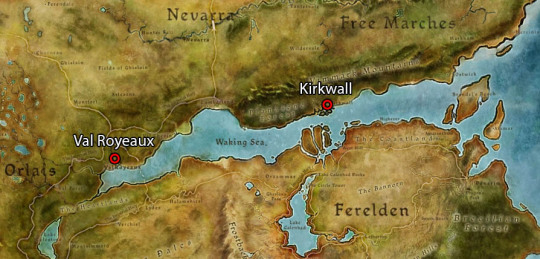
The Orlesian Chantry, founded by Kordillus Drakon I (the first emperor of Orlais), had from the beginning been dominated by Orlesian interests. According to World of Thedas vol. 1 (p. 56): “The Orlesian capital, Val Royeaux, is home to the Chantry’s Grand Cathedral, the center of the Andrastian religion’s power. Over multiple Blights, the Orlesians have used the Chantry to expand their influence beyond the nation’s impressive borders, notably to the north into Tevinter territory and southeast through Ferelden.” The Chantry, not surprisingly, had backed the Orlesian invasion and occupation of Ferelden, most recently under Divine Beatrix III (probably) and Grand Cleric Bronach of Denerim. It should be noted that this is all part of a pattern of highly-aggressive and imperialistic behavior that has persisted for centuries from the early years up to (potentially) the events of Dragon Age Inquisition.
It also cannot be emphasized enough that the Templars are the Chantry’s army and were created by the Chantry in the first place. They do not simply hunt and guard mages; they fight the Chantry’s wars and carry out its policies. Quote: “the Order of Templars was created as the martial arm of the Chantry” (Codex: Templars). According to First Enchanter Halden of Starkhaven (8:80 Blessed), “While mages often resent the templars as symbols of the Chantry's control over magic, the people of Thedas see them as saviors and holy warriors, champions of all that is good, armed with piety enough to protect the world from the ravages of foul magic. In reality, the Chantry's militant arm looks first for skilled warriors with unshakable faith in the Maker, with a flawless moral center as a secondary concern. Templars must carry out their duty with an emotional distance, and the Order of Templars prefers soldiers with religious fervor and absolute loyalty over paragons of virtue who might question orders when it comes time to make difficult choices. It is this sense of ruthless piety that most frightens mages when they draw the templars' attention: When the templars are sent to eliminate a possible blood mage, there is no reasoning with them, and if the templars are prepared, the mage's magic is all but useless. Driven by their faith, the templars are one of the most feared and respected forces in Thedas” (Codex: Templars). Likewise, a Chantry official confirms that the Templars are both “the watchers of the mages and the martial arm of the Chantry” (Codex: Seekers of Truth). In Dragon Age Origins, the (unwillingly) Templar-trained Alistair elaborates, “Essentially they’re trained to fight. The Chantry would tell you that the templars exist simply to defend, but don’t let them fool you. They’re an army... The Chantry keeps a close reign on its templars. We are given lyrium to help develop our magical talents, you see… which means we become addicted. And since the Chantry controls the lyrium trade with the dwarves… well, I’m sure you can put two and two together... The Chantry usually doesn’t let their templars get away, either.”
In response to Threnhold’s intolerable restrictions on the Orlesian navy’s movements in its traditional sphere of influence, Divine Beatrix III, an acknowledged “friend of the emperor” (and predecessor to Divine Justinia V of DAI), ordered the Kirkwall Templars under Knight-Commander Guylian to force open the Waking Sea. Viscount Threnhold retaliated for this obviously-illegal military interference by ordering the Templars expelled from Kirkwall and later executing the knight-commander. Then-Knight-Captain Meredith Stannard led the remaining Templars to storm the Keep and arrest Threnhold before appointing a weak viscount unwilling or unable to resist her control.
From Kirkwall: City of Chains by Brother Ferdinand Genitivi (Codex: History of Kirkwall: Chapter 4):
Taxes were crippling and Perrin Threnhold used the ancient chains extending from “the Twins” standing at Kirkwall's harbor—unused since the New Exalted Marches—to block sea traffic and charge exorbitant fees from Orlesian ships. The Empire threatened invasion following the closure of the Waking Sea passage, and for the first time, the Chantry used the templars to pressure the viscount. Until that point, the templars had done nothing to counter the Threnholds even though, as the largest armed force in Kirkwall, they could have. Knight-Commander Guylian's only written comment was in a letter to Divine Beatrix III: ���It is not our place to interfere in political affairs. We are here to safeguard the city against magic, not against itself.” The divine, as a friend to the emperor, clearly had other ideas.
In response, Viscount Perrin hired a mercenary army, forcing a showdown with the templars. They stormed the Gallows and hung Knight-Commander Guylian, igniting a series of battles that ended with Perrin's arrest and the last of his family's rule. The templars were hailed as heroes, and even though they wished to remain out of Kirkwall's affairs, it was now forced upon them. Knight-Commander Meredith appointed Lord Marlowe Dumar as the new viscount in 9:21 Dragon and she has remained influential in the city's rule ever since.
Given that this was written by a Chantry scholar, the self-justificatory rhetoric surrounding the viscount and the Chantry-instigated coup ought not be surprising. It appears, however, that in Kirkwall itself popular perceptions of Viscount Perrin Threnhold are in fact fairly polarized.
Whereas Brother Genitivi calls Perrin’s father Chivalry Threnhold “a vicious thug who took power through a campaign of intimidation” and Perrin Threnhold “even worse,” an unnamed servant writing 7 years after the coup paints a rather different picture (Codex: Viscount Marlowe Dumar):
What happened to Viscount Perrin Threnhold was a travesty. I served in the Keep, and my blood boils when I hear people call him a tyrant. He was a good man who tried his best to free Kirkwall from the control of those who use power for their own purposes. It's always been that way here, hasn't it? Long ago it was the Imperium. Then it was the Qunari, then the Orlesians, now the templars... when have we ever ruled ourselves? He tried to kick those templar bastards out and give us real freedom, and what did it get him?
Whether Threnhold was an evil tyrant or a nationalist hero (or both or something else entirely) is beside the point, however. He was not overthrown for mistreating the citizens of Kirkwall; he was overthrown for opposing Orlais and the Templars (acting as an arm of Orlesian imperialism and in defiance of their official duties). Seneschal Bran, himself no fan of either Threnhold or the Templars (and the only character to ever discuss the coup out loud), points this out in an easy-to-miss optional conversation in Act 3.
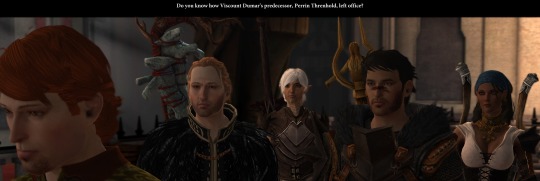


Hawke: What happens if they [the Templars] don’t like the [nobility’s] choice [of viscount]?
Seneschal Bran: Do you know how Viscount Dumar’s predecessor, Perrin Threnhold, left office? He was a tyrant, certainly, but his rule was not ended until he actively sought to expel the templars. “The good of all” is inexorably tied to what is good for the templars.
It’s unclear whether Knight-Captain Meredith was acting on her own initiative in toppling Threnhold or whether she received prior encouragement from the Chantry, but either way, what is certain is that the Chantry moved quickly to legitimize her actions and bolster the new order. Moreover, the intent to seize power for the Chantry and its military forces rather than “liberate” Kirkwall from the depredations of a tyrannical viscount can be seen in the way they illegally imposed their own viscount (one kept submissive through threats of violence) rather than allowing the people to choose or at the very least following accepted selection procedures (i.e., allowing the nobility to vote on the next viscount). Indeed, this refusal to let the nobility select the viscount as per tradition is the basis of Orsino's protest at the beginning of Act 3.
In any event, Grand Cleric Elthina, as the highest-ranking representative of the Chantry in Kirkwall (appointed to her position by Divine Beatrix III herself around 20 years before Act 1) and thus exercising authority over its Templars, presided over the show trial at the end of which Threnhold was imprisoned and later murdered in his cell. Then she rewarded Meredith with a promotion.
According to the codex for Knight-Commander Meredith:
She is credited with removing the previous viscount, Perrin Threnhold, from his position after he attempted to have the templars expelled from the city in 9:21 Dragon. The acting knight-commander was arrested and executed, and Meredith led a group of templars into the heart of the Keep to capture Threnhold. He was tried and imprisoned three days later by Grand Cleric Elthina and died from poisoning two years later. Meredith was subsequently elevated to her current position.
While merely implied here, Elthina is explicitly confirmed to have given Meredith the position of knight-commander in the first place in World of Thedas vol. 2 (p. 193):
Following Threnhold’s arrest, Grand Cleric Elthina appointed Meredith as the new knight-commander. At Knight-Commander Meredith’s suggestion, a new viscount was chosen: a man named Marlowe Dumar.
Then in blatant violation of Kirkwall’s own laws and traditions -- again, dictating that the viscount be chosen by the nobility -- the Chantry had allowed newly-installed Knight-Commander Meredith to select the new viscount. If approached in the Templar-occupied Viscount’s Keep and spoken to in Act 3, Seneschal Bran will explain:
Bran: When a line is judged unfit, or ends, we appoint from Kirkwall’s elite. Or we would, if the situation was normal. But it is not.
Hawke: Who nominates a new viscount?
Bran: A consensus of the nobility. Normally. And a willing nominee.
It seems to be the general consensus that Marlowe Dumar was chosen specifically because he was weak and willing to play the role of Templar/Chantry puppet (a subheading in Dumar’s WoT v2 entry even explicitly calls him “The Puppet”). Meredith, after all, is not only responsible for his appointment but has been threatening him into compliance from the very beginning.
Again, Brother Genitivi writes quite bluntly:
Knight-Commander Meredith appointed Lord Marlowe Dumar as the new viscount in 9:21 Dragon and she has remained influential in the city's rule ever since.
And quoting once more from the unnamed servant:
Now the Chantry has chosen Lord Marlowe Dumar as his replacement. After weeks and weeks of arguing, after telling the nobility that they would be choosing their viscount, after everyone saying it was time to use a new title—why not "king"? Why keep using the name imposed by the Orlesians? And after all that, the Chantry chose him. I suppose I can see why—everyone thinks he has the spine of a jellyfish, and it does seem that way.
Truly, he has the templars on one side, the nobility on the other, and everyone expects him to solve all their problems—yet he has no power to actually accomplish it. He keeps the peace as best he can, and I think he does a good job even if no one else does.
Likewise, to quote from Marlowe Dumar’s entry in World of Thedas vol. 2 (p. 184-185):
The new knight-commander, Meredith, appointed Marlowe to the seat, much to his surprise. Just before he was crowned, he met in private with the knight-commander at the Gallows. Marlowe was escorted, surrounded by grim templars, to Meredith’s well-appointed office, and there, she explained her reasons for the choice. Kirkwall was filled with entitled degenerates... “With my help, you will turn this city around,” she said. “We will be allies.” Meredith’s message was clear: Remember who holds power in Kirkwall. Remember what happened to Threnhold when he overreached. To drive her point home, she presented Marlowe with a small carven ivory box at his coronation. The box contained the Threnhold signet ring, misshapen, and crusted with blood. On the inside of the lid were written the words “His fate need not be yours.” Marlowe ruled Kirkwall without incident for almost a decade, in no small part thanks to Meredith’s backing. During his reign, the templars grew even more powerful, and the knight-commander’s influence was evident in almost every one of Marlowe’s decisions.
And from Meredith’s entry in WoT vol. 2 (p. 193):
Meredith presented Dumar with a carved ivory box at his crowning. All present witnessed the viscount going white as a sheet as he opened it... It is not known what the box contained, but the reaction from Dumar made its importance to him obvious. What is certain is that Dumar never openly or strongly defied the templars. Over the course of his reign, Meredith’s grip on Kirkwall grew ever tighter, and Dumar’s failure to act absolutely contributed to the events that led to the mage rebellion.
According to Lord Bellamy, “a longtime political ally of Dumar’s” (p. 193):
“Dumar had a good heart. A good heart and a weak will. On his own he might have made a good leader, given time. But he wasn’t on his own. The knight-commander was always there, looking over his shoulder. She let him know she was watching, that he wore the crown at her sufferance. Meredith appointed him. This was a nobleman of only moderate wealth, with little influence. She knew she could control him and there was little he or anyone else could do about it.”
Ultimately, the coup not only secured Chantry control over Kirkwall but furthered their (and the Orlesian Empire’s) geopolitical interests in the Free Marches as a whole. After all, the “Free Marches is [sic] best known as the breadbasket of Thedas. Its farms along the banks of the great Minanter river are the source of much of the continent’s food” (World of Thedas vol. 1, p. 65), and as with many a real-world “breadbasket,” its natural abundance and misfortune of lying between multiple empires had made it the target of one invasion and occupation after another. After the slave revolt of 25 Ancient toppled the Tevinter Imperium’s hold over the region (see Codex: History of Kirkwall: Chapter 2), the city-state of Kirkwall fell to Qunari invasion in 7:56 Storm, then invasion and occupation by the Orlesian Empire in 7:60 Storm, and finally gained its independence about 45 years later in 8:05 Blessed (see Codex: History of Kirkwall: Chapter 3). Prior to the Chantry-instigated coup, Kirkwall had enjoyed independence under a locally-chosen viscount for around 115 years, with Viscount Perrin Threnhold himself ruling for 7 years.
Other city-states of the Free Marches have likewise fallen under the Chantry’s sphere of influence (if not outright control):
Starkhaven is ruled by the Vael family. According to the codex for The Vaels, “They remain devout, dedicating at least one son or daughter per generation to become a cleric in the chantry.” The sole potential heir to the throne of Starkhaven is of course our DLC companion Sebastian Vael, “The Exiled Prince.” To quote from his first codex: “Sebastian Vael is the only surviving son of the ruling family of Starkhaven, which was murdered in a violent coup d'etat. Sebastian cannot forget the irony that he still lives only because his family was so ashamed of his drinking and womanizing that they committed him to the Kirkwall Chantry against his will… Since then, his belief in the Maker and His plan for Thedas have been unshakable. Embracing his new role, Sebastian took vows of poverty and chastity to become a sworn brother of the Chantry... until word of his family's deaths forced him to take up worldly concerns once again.” Elthina appears to have been playing mind games with Sebastian from the very beginning -- first she agrees to have him confined in her Chantry, then poses as a secret benefactor helping him escape from her clutches, with the revelation of her identity as said pretend benefactor leading him to embrace her authority and the life of a Chantry brother with genuine enthusiasm (see the Sebastian short story or his WoT v2 entry for details). After his family’s murder, Elthina urges him to remain with her rather than reclaim the throne. Yet when he gives up on seeking the throne and actually does attempt to return to the Chantry during “a crisis of faith,” he is “turned away by Grand Cleric Elthina, who believed he had not yet committed fully to either course” (see Codex: Sebastian - The Last Three Years), leaving him confused and even more under her thrall than ever.
Ostwick is dominated by the devout, staunchly pro-Chantry Trevelyan family. According to the codex for Trevelyan, the Free Marcher: “It is an old and distinguished family, in good standing among its peers, and with strong ties to the Chantry. Its youngest sons and daughters—those third- or fourth-born children with little chance of becoming heirs—often join the Chantry to become templars or clerics.”
Tantervale is certainly... special. According to WoT vol. 1 (p. 71): “Chantry rule is all but absolute in Tantervale, earning the city its dour reputation. The city guard is obsessed with enforcement. A street urchin would get a year in the dungeon for something that would get him a pat on the back in Orlais” (p. 71).
But let us return to Kirkwall, shall we?
"The Puppet”: The Reign of Viscount Marlowe Dumar (9:21-9:34 Dragon)
Viscount Marlow Dumar’s status as an impotent tool of the Chantry and its Templars appears to be common knowledge in Kirkwall. Various characters, from city guards to lowlifes like Gamlen, casually refer to Meredith as if she is head of state and defer to her authority.
Immediately upon approaching the gates of the city in the first quest of the game, The Destruction of Lothering (Act 1), the following exchange occurs:
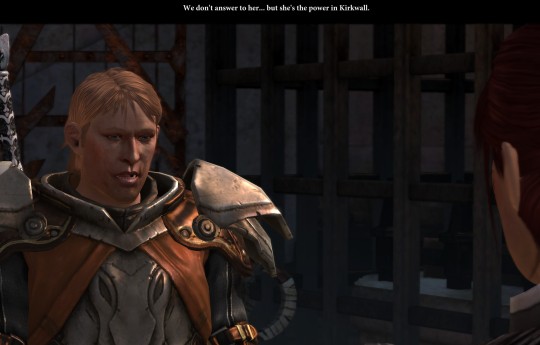


Guardsman Wright: So Knight-Commander Meredith wants us to sort you all out. Most of you are getting right back on your ships, though.
Hawke: That's a templar title. Why would a city guardsman answer to the templars?
Wright: We don't answer to her... but she's the power in Kirkwall. Don't know what would happen if the viscount went against something she wanted... But he's sure never taken that chance.
Likewise, if asked about “the word on the street,” Corff the bartender remarks as early as Act 1, “People say Meredith's the real power in Kirkwall, not the Viscount. Even Dumar answers to her.”
Ordinary citizens appear terrified of Meredith, and with good reason. During the quest Enemies Among Us (Act 1, set in 9:31 Dragon), we get the following exchange with the sister of a Templar recruit:
Macha: I pleaded with him not to join the Order, but he wouldn't listen. You hear dark rumors about the templars and Knight-Commander Meredith. And now my brother is gone.
Hawke: (“Are templars so bad here?”) In Lothering, some templars died protecting villagers. I never heard any dark rumors.
Macha: And those are the stories my Keran adored. But it is not like that here, serah. There is a growing darkness in the order. They prowl the streets in packs. Hunting. And now, they say their duties put them above us, that they have the right to... take people from their homes. It is frightening.
Hawke: (“Tell me about Meredith”) What do people say about Knight-Commander Meredith?
Macha: Oh, she has many admirers. They laud the service she does in keeping the mages in check. But others say she is terribly fierce and utterly without pity. That she sees demons everywhere. It is dangerous even to whisper such things. People harboring escaped mages just disappear. Templars interrogate and threaten passers-by. My friend has a cousin who’s a mage, and she says he was made Tranquil against his will. You hear more with each passing day.
Of course, Knight-Commander Meredith’s reign over the Gallows was notoriously brutal long before she came into contact with Red Lyrium. Writing 3 years after the coup (but 7 years before Act 1), in 9:24 Dragon, Brother Genitivi remarks that "Kirkwall has been a tinderbox since becoming the center of templar power in eastern Thedas." As early as Act 1, mages in the Gallows can be heard crying out, “This place is a prison,” and “Knight-Commander Meredith would kill us all if she could.” When asked if mages are imprisoned, the guardsman replies, “Used to be, back in the Imperial days. They kept slaves here until the rebellion. Now the templars run it and use it to lock up their mages. Guess not much has changed” (The Destruction of Lothering, Act 1). Karl Thekla’s final letter before being turned Tranquil (with such illegal uses of the Rite having been repeatedly reported to Meredith) “said the knight-commander was turning the Circle into a prison. Mages are locked in their cells, refused appearances at court, made Tranquil for the slightest crimes” (Tranquility, Act 1). If Hawke questions the truth of these accusations, Anders responds, “Ask any mage in Kirkwall. Over a dozen were made Tranquil just this year. The more people you ask, the worse the rumors become.” (Elthina also appears to be aware at least to some extent of the subsequent ambush, in which a Tranquil Karl was used as bait to ensnare his former lover).
According to the short story Paper & Steel (focusing on Samson): “Under Meredith, freedom was a cruel dream for Kirkwall’s Circle mages. They were often locked in their cells, watched night and day by templars who were told any step out of line was suspicious. All those young magelings, told that magic was a curse, that they were dangerous, and that they had to be shut indoors all their lives looking out through those windows. Some went mad. Others, mad or not, tried jumping.” And from First Enchanter Orsino���s entry in World of Thedas, vol. 2 (p. 195): “Every time a mage died by their own hand, Orsino would hear Maud’s final words to him: 'This is no life.’ The templars didn’t seem to care about the suicides. Most had the courtesy to say nothing at all, but some would snigger when they thought no one was listening. 'One less to worry about.’ ‘The only good mage is a dead mage.’ Orsino’s anger at the templars grew...” (Note that this began long before Orsino became first enchanter in 9:28, three years before the start of the game). It's also worth noting Knight-Captain Cullen Rutherford quite explicitly attained his position as second-in-command of the Kirkwall Templars position because of his anti-mage extremism, later including violence against those perceived as mage sympathizers and their families.
To name more specific abuses, the Gallows features whipping posts (with dialogue confirming the reliance on whipping) and multiple other medieval torture devices, including a rack, a pillory, and iron maidens. We also see numerous references to casual beatings, sexual assaults, forced Tranquility and facial branding, long-term confinement in dark cells, and permanent family separation (e.g., Emile du Launcet). Escape attempts are typically punished with summary execution, according to multiple sources (e.g., Ser Thrask, Ser Karras, Grace). According to Ser Thrask, the most sympathetic Templar (besides Carver), kindness to mages would be a "badge of shame" among among his colleagues. For more, I recommend checking out the “DA2 mage rights reference post” by @bubonickitten. Again, note that these are cruelties largely occurring prior to or during Act 1, long before Meredith started going insane due to Red Lyrium.
If Feynriel is forced into the Circle at the end of Wayward Son (Act 1), the ex-Templar Samson says, “I hear they got your boy Feynriel locked up in the Circle. Bad business, that. It ain't all templars that're bad. It's hard luck being born a robe, but most places, they make it work. That bitch Meredith runs the Order in this town like her private army. You don't toe the line, you end up on the next corner here in Darktown. I don't think you got to hate mages to love the Order. But Meredith don't agree.” Samson, it should be remembered, had been expelled from the Templar Order for passing love notes from the mage Maddox to his lover. For the crime of “corrupting the moral integrity of a templar,” Meredith ordered Maddox turned Tranquil. According to Cullen in Before the Dawn (DAI), “Knight-Commander Meredith wielded the brand for far lesser offences, believe me."
Ordinary citizens appear to be well aware of at least some of Meredith’s reign of terror in the Gallows, given that various NPCs (including some who do not personally know any inmates) will refer to it. During Tranquility (Act 1), for example, a mob of Ferelden refugees threatens the party over fears that the latter intend to turn in “The Healer of Darktown” to the Templars. One exclaims, "We know what happens to mages in this town. And it ain’t gonna happen to him." Moreover, the knowledge is sufficiently widespread as to have reached faraway countries. A note dated 9:35 (set between Acts 2-3) from a mage of the Hossberg Circle in the Anderfels expresses utter horror: “I have heard that in the Kirkwall Gallows, mages are locked in their cells with barely room to stretch, let alone exercise. I can promise you that any mage of the Anderfels would be stark raving mad after a week of such treatment... No wonder Kirkwall has such trouble with blood mages” (WoT v2, p. 173).
And through all of this, Meredith has the support of the Chantry and more specifically Grand Cleric Elthina.
Not only did Elthina appoint Meredith to her position in the first place (WoT v2, p. 193), but if asked her opinion on Meredith in Act 1, Elthina snaps, “Gossip is a sin, child. Knight-Commander Meredith has an admirable devotion to her duties. It is not my role to form opinions on her character.” An odd statement to make about a subordinate, since Meredith reports to her directly (as knight-commanders legally do to the nearest grand cleric). The codex for Knight-Commander Meredith confirms at as of the end of Act 2, “she enjoys the grand cleric's full support and has free rein in Kirkwall as the commander of its most powerful military force.” According to Elthina’s codex, many claim that Elthina “allows Knight-Commander Meredith more leeway with each passing year.” According to World of Thedas vol. 2, which tries to put a more positive spin on Elthina’s role, her detractors “say her stubborn refusal to exercise her Chantry-given authority allowed the conflict between the templars and mages to escalate, finally resulting in the disastrous mage rebellion of 9:37 Dragon... Since Elthina was loath to exploit her authority as grand cleric, she refused to order either the mages or templars to stand down when tensions flared. Many believe that she could have forced one side to retreat by showing her support for their position, but Elthina refused to take sides” (p. 196-197). This is at best an abdication of responsibility to dependents for someone intent on remaining in power.
Moreover, Elthina’s dominance over Kirkwall appears to depend in large part on at least appearing to manage Meredith and her troops. According to her codex, “People frequently turn to her to mediate disputes—particularly those involving the powerful Templar Order, over whom she holds authority as the Chantry's ranking representative.” So Meredith as military leader rules both the Circle and the city-state through fear and violence, while Elthina maintains her power by playing Good Cop to Meredith's Bad Cop. Both then maintain a pretense of legality and legitimacy by fronting Viscount Dumar as the public face of the regime.
And this dual-power system works quite well for them -- at least until Meredith starts losing her mind under the influence of the Red Lyrium idol.
[A link will later be provided for Part 2 on Escalation and Direct Rule. If I ever do get to it 😭😭😭]
#dragon age 2#dragon age#dragon age lore#dragon age meta#da meta#chantry critical#anti chantry#anti orlais#templar critical#anti templar#da2#knight commander meredith#meredith stannard#kirkwall#kirkwall gallows#grand cleric elthina#elthina critical#Cullen critical#viscount marlowe dumar#orlais#free marches#orlais critical
605 notes
·
View notes
Text

WINTER BREAK
much like marriage matches, the stakes are pretty high for getting into the cardinalate. you might be a little on edge if the brother that's been earmarked for the role isn't really jazzed about the whole thing, in addition to trying to convince the pope that it's in his best interest to let this happen.
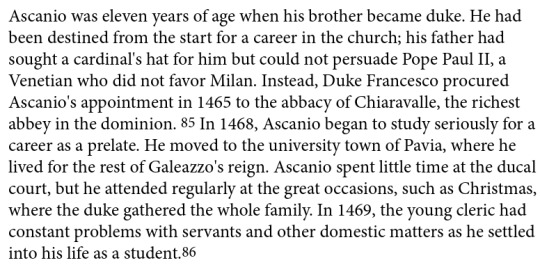
A Renaissance Court: Milan Under Galeazzo Maria Sforza, Gregory Lubkin
eventually I'm going to get the whole cast of sforza siblings drawn. there's just. a lot of them.
#in true oldest sibling/head of the house fashion galeazzo will continue to bring up ascanio's early clerical life up until he dies lmao#anyway ascanio's got a weird thing going on with fathers. there's that portrait story and also whatever the fuck was up with#ludovico like i get that it was probably his way of going heyyyyy! look at me! i'm just a little guy! i'm not a threat! but it's also very#veryyyyyyyyyyyyyyyyyy. something#italian renaissance tag#komiks tag#lmao i finally decided to bite the bullet and make a whole separate blog for a future sforza comic like at this point im locked in and#committed to the sforzas.#MOVING BACK TO ASCANIO it's kind of. uh. sometimes i'll read a chapter of the biography and it'll describe something that's#very obviously a major depressive episode and i'm like. man. look at that. you gave a perfectly good would be dynast a major#depression disorder. imagine the problems he would've caused if they had anti depressants back then
146 notes
·
View notes
Text
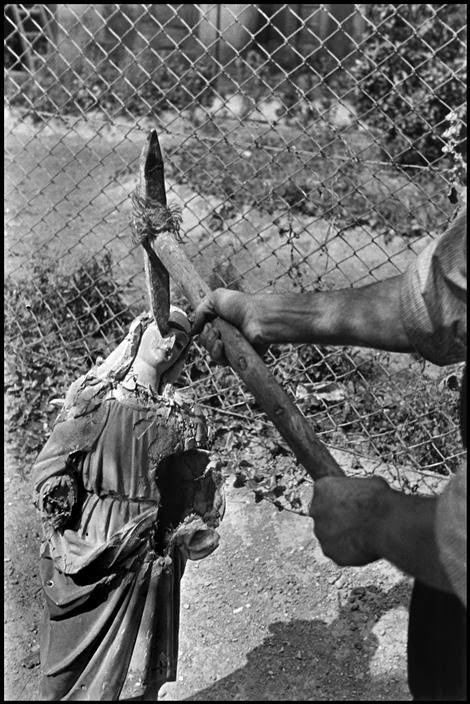
During the Spanish revolution and the ensuing civil war, Spanish workers and peasants engaged in anti-clerical violence against the Church that spent centuries raping, molesting, murdering, beating, abusing, and oppressing them.
#communism#socialism#marxism#leftism#leftist#communist#marxist#socialist#anti capitalism#dismantle capitalism#religion is a scam#religion#catholic#catholicism#catholic church#spain#spanish civil war#spanish revolution#anticlericalism#anti clericalism#atheist#atheism#anti theist#anti theism#antitheist#antitheism#peasant#peasants#marx#karl marx
106 notes
·
View notes
Text
we'll do it again.

The medieval Saint Michael's Golden-Domed Monastery in Kyiv, Ukraine, shortly before it was demolished by the Soviets in 1935. X
#communism#communist#soviet union#ussr#blow up more churches#atheist#atheism#anti clerical#anti clericalist#anti clericalism#anti theist#anti theism#antitheist#antitheism#anticlerical#anticlericalist#anticlericalism#secular#secularist#secularism#marx#marxism#marxist#karl marx
129 notes
·
View notes
Text


Finally got to act 3 on my Shadowheart romance run. This scene is really sweet. But, ladies, you are wet and naked and rolling around on the beach, you are going to get sand everywhere.
Everywhere, girls.
Everywhere.
#maybe clerics get some sort of anti-sand spell?#baldur’s gate 3#shadowheart#jenevelle hallowleaf#bg3 shadowheart#my tav#bg3 tav
23 notes
·
View notes
Photo

October 14, 2022 - A statue of Ayatollah Khomeini is torn down by protesters in Neyshabur, Iran, on the 28th day of protest following the death of Jina Mahsa Amini at the hands of the religious police. [video]
#2022#iran#gif#jina mahsa amini#mahsa amini#statue#ayatollah khomeini#anti-clericalism#riot#neyshabur#feminism#monument
79 notes
·
View notes
Text
Tav memes part 3/?
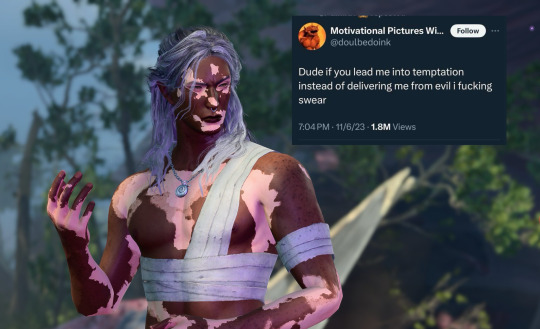



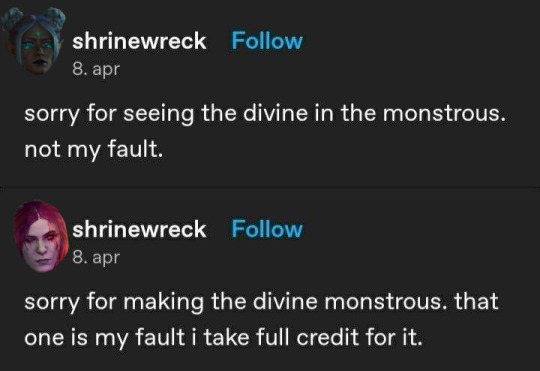



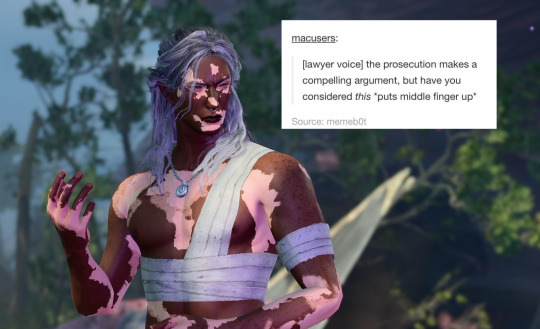

#i have a bunch of older memes too but idk if i'll post them#this is a solace-heavy batch#vehemently anti-authoritarian clerics of ilmater my beloved#solace riadyr#candor delmar#io dein#diodore#blood of the covenant#arbutus#bg3#my post#bg3 tav#bg3 shitpost#bg3 memes#bg3 durge#nightingales#the star's shield
7 notes
·
View notes
Text

*🔥*
#félicien marceau#vautrin#la comedie humaine#hearts eyes emoji#this was comedy gold balzac had in his hands#but he was sadly not interested in going into the tartuffe side of things#the satanism is there and the covert anti clericalism#but boy wouldn’t it be hilarious to see vautrin giving mass#at least goriot era vautrin#herrera can be dull af#but he hated being a priest. understandable
3 notes
·
View notes
Text
“Nations slaughter each other for family quarrels, cutting each other's throats in the name of the Ruler of the Universe, knavish and greedy priests working on their imagination by means of their love of the marvellous and their fears.”
— Napoleon Bonaparte
#Napoleon#quote#war#Anti-clericalism#napoleonic era#napoleonic#napoleon bonaparte#Napoleon quote#the enlightenment#france#french revolution#frev#napoleonic wars#pamphlet#Europe#royalty#royal families#history#European history#radical napoleon#jacobin#jacobin Napoleon
30 notes
·
View notes
Text
guess who has to fight an ancient white dragon to further my character's resurrect-a-dead-god quest?!
[terrified screaming]
#not cr#the restful goose#our artificer who's been working on an anti-dragon ballista for our soon-to-be armored cart is delighted#as is the barbarian#...me (the cleric) and our bard are. less delighted
21 notes
·
View notes
Text
This is me answering the byler asks no one asked me:
Do you think we will get a byler ily moment?
-Well I’m a bit torn on this one. Other endgame couples haven’t said it, but maybe they will in s5. And in that case I would definitely want to see the contrast between Mike being pushed to say something he doesn’t mean and Mike voluntarily saying something he really means.
Do you think Mike or Will will die?
-I think Mike might die temporarily, but Will will somehow bring him back. The Duffers didn’t write him to be a cleric for nothing!!
In which episodes we get byler scenes?
-In all of them, but the main moments will probably be like this: ep1 milkvan breakup, ep2 painting drama, ep4-3 gay pining, ep5-6 dramatic discussions and Mike realizing his feelings, ep7 the first byler kiss and ep 8 more byler kisses and happy ending for them
Do we get a rain kiss?
-I hope we get a heartstopper -type rain kiss! Not in the dark of the night, but at the light of day. There will be sun but also rain, reminding them that they are no longer in the weatherless upside down. (Also a rainbow would be so cool!)
Is Mike bi or gay?
-Doesn’t matter to me and I’m fine with the show not labeling him at all. (The only reason I would want him labeled is to stop people from fighting about it)
Byler?
-Endgame.
#byler#byler is endgame#st5 predictions#byler prediction#byler speculation#mike wheeler#will byers#will byers has powers#byler theory#paladin and cleric#stranger things#byler canon#byler endgame#byler s5#byler rain kiss#byler kiss#byler tumblr#mike’s monologue#anti milkvan#bi mike wheeler#gay mike wheeler#unlabeled mike wheeler#mike wheeler i know what you are
53 notes
·
View notes
Text
but anyway if the Protestant Reformation and French Revolution were such great crimes against Christianity maybe the church should have done a better job when it was in power
#you know what though actually the anti-clericalism of the French Revolution was very unpopular#hence Napoleon reinstating religion#popularly#France has a turbulent relationship with religion and indeed everything else#being France
8 notes
·
View notes
Text
Also I just thought of a couple more things
1) Lore says that Ludwig saw the flickering lights of Guidance when he closed his eyes (in the darkness). Depending on the timeline, it could have been the inspiration for Willem and the Choir to use the Blindfold! Because they learn that Great Ones will show them the way if they trust them like this by sacrificing their own vision.
2) I can actually totally see Ludwig and Laurence both having serious descent in their sanity (if you can call a Bloodborne character that...) after Hunter's Dream was created! Like, what if after Moon Presence left with Gehrman, hard (if possible at all) to perceive? Maybe since then Ludwig's sword stopped giving off that light and it "helped" him to go more erratic with the hunt in hopes to be shown the way once more, and maybe Laurence started to grow way more corrupt without that spirituality aspect left in his life and with just holy blood as his method to connect with something big? Not saying all their misery happened because they learn that Great Ones will show them the way if they trust them like this by sacrificing their own vision.
3) Under assumption that Laurence never put on the blindfold because "I will be fine I can have my own agency and still not screw up unlike you heretics", it makes even more sense for him to consume too much blood, since Byrgenwerth's sedatives that help to handle presence of Eldrich Truth better ARE based on the blood
#bloodborne#write this down patrick!!!!!!!#ludwig the holy blade#laurence the first vicar#bloodborne headcanons#i finally found justification for why my Laurence is so... anti-arcane after Hunter's Dream and he put on the crown#because now Flora is way too absent to give any sort of consolation!#really it looked a bit weird descent from the Flora's bestie to the corrupt cleric#like bro how you became so materialistic after doing all that?#but really the answer is that she just left when she got what she wanted (fair enough)
6 notes
·
View notes
Quote
Five years later the Commons renewed its attack and presented a bill for the wholesale disendowment of bishoprics and greater monasteries, ‘because of priests and clerks that have now full nigh destroyed all the houses of alms within the Realm'.
The hostility of London toward the Church before Anne Boleyn (Wyers, Maxine)
3 notes
·
View notes
Text
British when the south americans first developed anti-colonialism: drake_yes.png
British when the Indians developed anti_colonialism: surprised_pikachu.jpeg
#question for the audience: was the monroe doctrine in the early/mid 1800s anti-colonial?#consider the targets of american military force during the era: was this anti-clerical? was it discriminatory against catholics?
2 notes
·
View notes
Text
thinking abt dnd ocs who arent even CLOSE to reaching fruition but crying about them anyway
#could a catholic heehee :) boy and a anti-organized-religion bruh girl be in love#they’re clerics. for context
3 notes
·
View notes